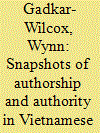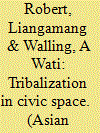| Srl | Item |
| 1 |
ID:
153532


|
|
|
|
|
| Summary/Abstract |
Until recently, the dominant interpretation of the concept of authorship in East and South East Asia held that in these regions there was no author—in the Western sense of the term—because authorship was communal and was determined by a layering of interpretations of classic texts through the process of commentary. This has allowed commentary on authorship in Asia to largely sidestep substantive critiques of the politics of authorship offered by Michel Foucault and Roland Barthes. While not refuting this interpretation, this article claims that the issue of authorship is considerably more complicated than this dominant interpretation might imply. In Vietnamese annals such as the Đại Việt Sữ Ký Toàn Thữ, commentators such as the literatus Ngô Sĩ Liên tried to assert their authorship by supplanting or refuting previous authors. In addition, the question of authorship in pre-modern Vietnam is often confused by the lack of a clear delineation between different languages and texts, which is why one can often find pre-modern texts interspersed with chữ Hán (classical Chinese), chữ Nôm (classical Vietnamese), quốc ngữ, and even Lao or Muong. These strategies of authorship changed in the late 19th and early 20th centuries. Drawing on the work of Naoki Sakai, Keith W Taylor, and OW Wolters and on materials from the annals, civil service examinations, and modern writings, this article argues that the concepts of authorship, individual subjectivity in language, and language differentiation all coincided with the rise of nationalism at the turn of the 20th century. Authorship and nationalism are then tied to the concept of the separation and translation of languages and cultures, which are in turn related to the need to configure a particularistic Vietnamese identity vis-a-vis a perceived “West.”
|
|
|
|
|
|
|
|
|
|
|
|
|
|
|
|
| 2 |
ID:
190312


|
|
|
|
|
| Summary/Abstract |
The Naga, comprised of various tribes, were traditionally governed by independent village republics. The inclusion of the Naga areas into the modern Indian State has been opposed, ensuing in a long-drawn armed struggle for sovereignty. Military measures have been used to deal with this struggle. Naga society is characterized by dualities in the form of the categorization of tribes as an administrative category against the discourse of a greater Naga identity, experiences of electoral politics to the Naga indigenous form of democracy rooted in the village republic, and the protracted Naga political struggle to the idea of Nagaland state as a solution, among many others. These dualities have shaped collective actions in the forms of associations and organizations to constitute the Naga civil society. The paper examines the socio-political realities and the resulting collective actions as a dimension of civil society.
|
|
|
|
|
|
|
|
|
|
|
|
|
|
|
|